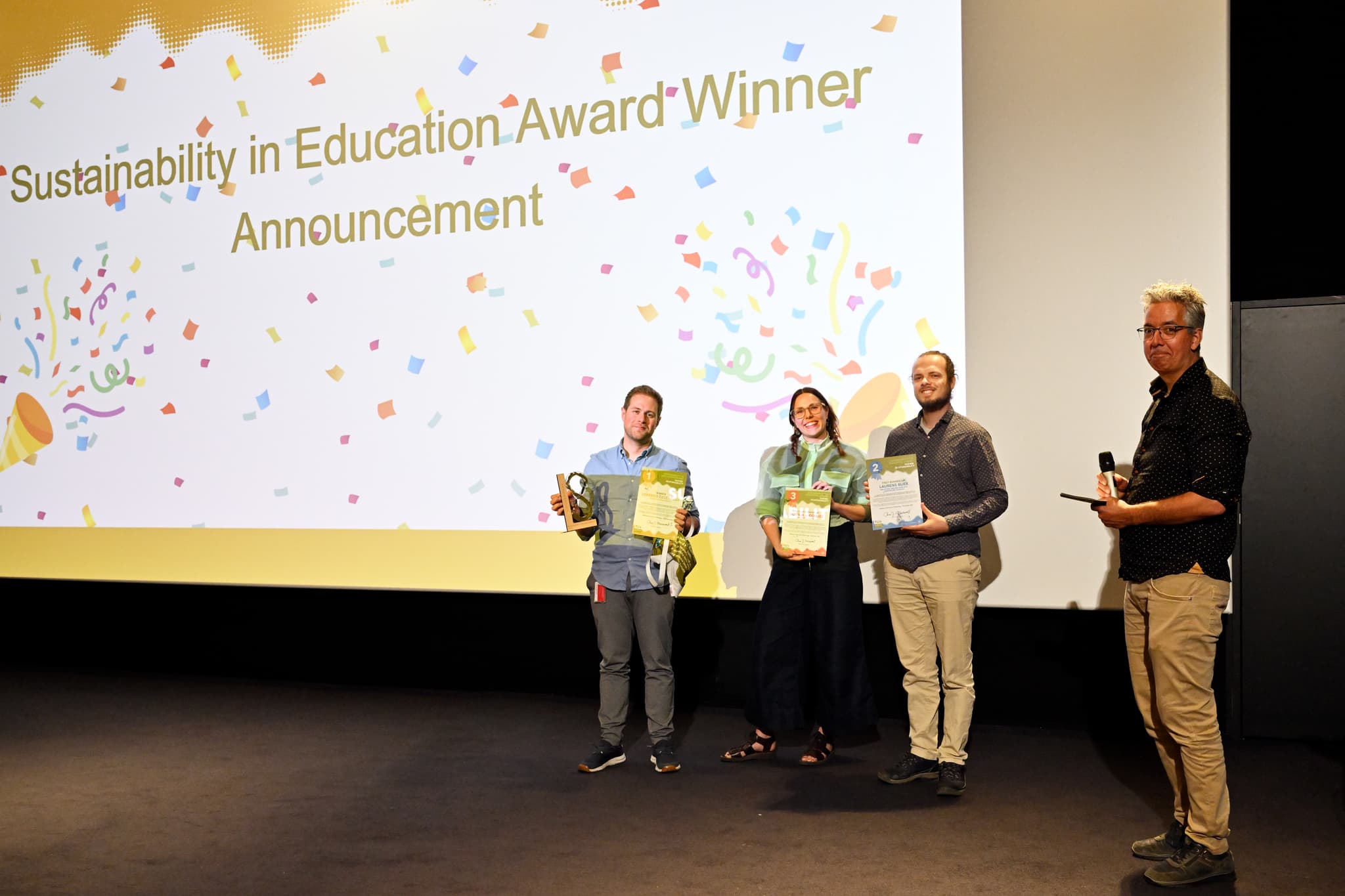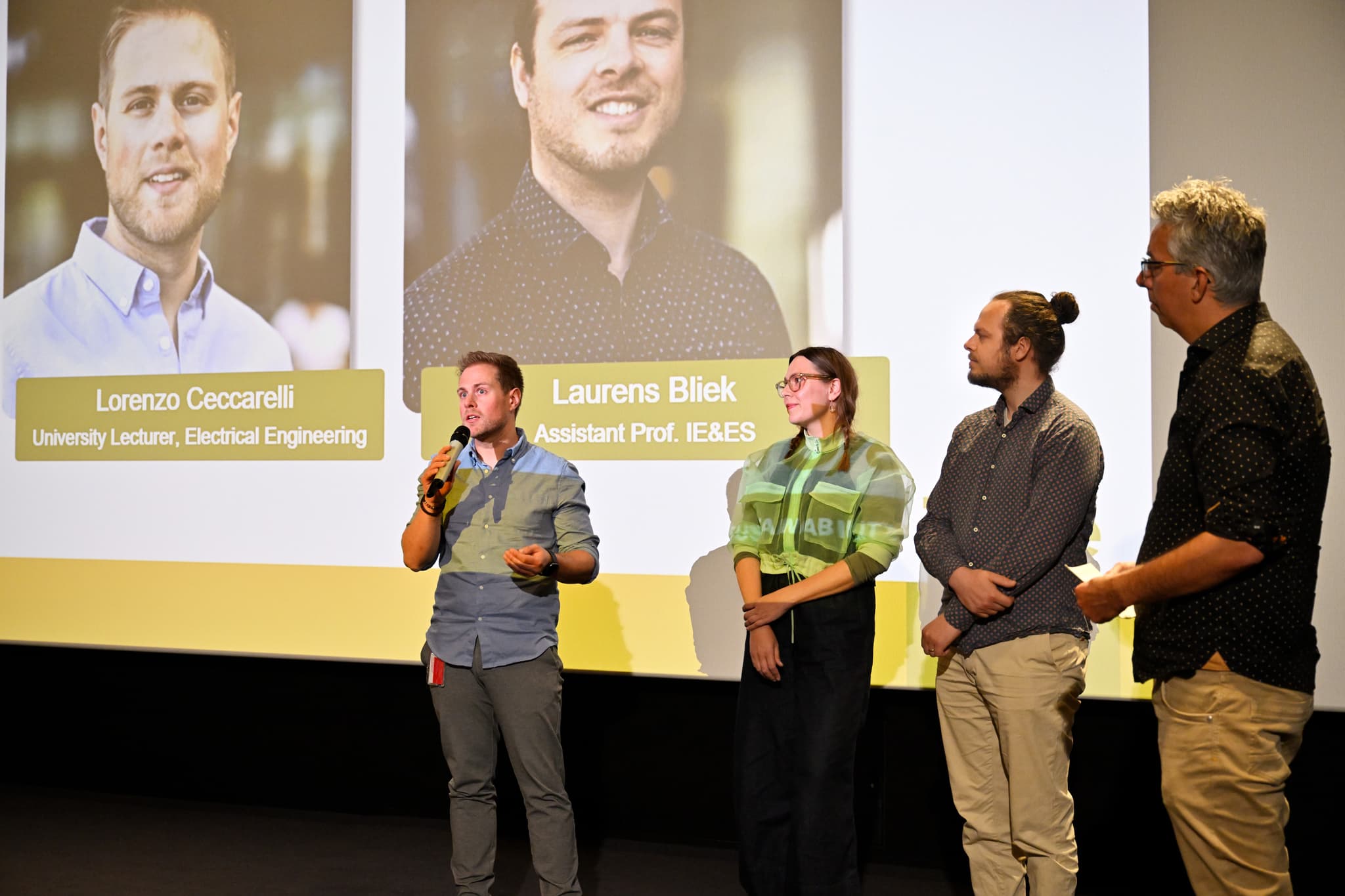TU Eindhoven rewards sustainability in education with an award
Lorenzo Ceccarelli wins the TU/e Sustainability in Education Award with his new course on circular electronics.
Published on May 21, 2025

© Bart van Overbeeke
As Head of Partnerships, Linda liaises with new partners. She coordinates all ongoing collaborations and connects our journalistic editorial and commercial articles. She is not only the connector behind our articles, but also all of our events.
Climate is changing, biodiversity is decreasing, and the amount of (e-)waste on Earth is soaring. We face major challenges when it comes to sustainability. “The current model, based on endless economic growth, no longer works. A new approach is needed,” argues Lorenzo Ceccarelli, University Lecturer at Eindhoven University of Technology (TU/e). He urges a comprehensive approach to the issue. “It's not only about technological possibilities, but also social aspects. Only when you understand the whole system you can come up with good solutions.”
This also applies to education. “Transdisciplinary education and challenge-based learning are becoming more important,” he says. In challenge-based learning, for instance, students from different programs work together on real-world challenges. This often involves other organizations, such as companies or governments, as stakeholders.
Appreciation for teachers
Ceccarelli won the TU/e Sustainability in Education Award for his approach and vision in education. The award was presented for the second time this year. He was chosen from a total of 19 nominations. “Sustainability is a high priority at TU/e. Many lecturers are working daily to integrate it as much as possible into education,” said Tommaso Mondovì, sustainability education developer at TU/e.
However, lecturers are often judged based on scientific achievements, such as research publications, and not on teaching achievements, Mondovì observes. The Sustainability in Education Award changes that. Ceccarelli sees the award making sustainability in education a more frequent topic of conversation in research groups and among teachers themselves. “It makes people think it's normal to pay attention to this, it becomes the standard.”
Green Week
The Sustainability in Education Award ceremony was part of Green Week at TU/e. From May 19 to 23, the university organizes various lectures, workshops, and other activities related to sustainability. This year's theme: Responsible Resourcing; the power of reusing resources on campus, in habits, and the future.
Circular electronics
Ceccarelli and his team spent the past year and a half working on a new course - Circular Electronics - for second-year undergraduate students. The students tackled the challenge of making electrical waste a thing of the past. “E-waste is the fastest-growing waste stream in the world right now. Moreover, electronics contain many rare materials, which are currently hardly recycled. Some 80% of discarded devices end up in landfills or are shipped to Global South countries where they are taken apart under poor conditions, with many harmful consequences for people and the environment.”

© Bart van Overbeeke
Working in an ecosystem
During Ceccarelli's course, students learn a lot about designing electronics with circularity in mind. “You deal with many different parties with interests and goals. We offer workshops to help the students understand the system, then they are free to formulate their research question and possible solutions are implemented. The involved stakeholders help them with knowledge and expertise.” Currently, 48 students from eight different programs are participating in the course, which is being taught for the first time this year.
Cecarelli wins a €2,500 cash prize to spend on innovation in education. “I think I will invest it mainly in materials and tools needed for the course. We can also possibly use this money to organize workshops with external experts.” The associate professor plans to expand the new subject soon. “We had more applications from students than places for this course. I hope we can welcome more students next year. In addition, it is always good to see if more stakeholders can join. For example, we are already working with several companies and nonprofit organizations, but not yet with parties that could bring in the legislative and regulatory perspective. That would be a nice step for next year.”
Shaping the future
The other nominees also continue to work on sustainability in education. It is a broad theme that will become even more important in the coming years. Mondovì: “Everyone can work it out differently, and that's good. The most important thing is to think together about innovation in education.”
Another nominee, Doenja Oogjes, university lecturer in Industrial Design, said, “As a technical university, TU/e plays a crucial role in educating the next generation of designers and engineers. Embedding sustainability in education ensures that students develop not only technical expertise, but also ecological awareness and ethical responsibility.” University associate professor Oscar Tomico Plasencia, also nominated for the award, sees an important role for teachers: “Teaching is a way of shaping the future. We have a responsibility to look critically at our own research and teaching activities and adapt them to the current climate and ecological crisis in which we live.”
Sponsored
This story is the result of a collaboration between TU/e and our editorial team. IO+ is an independent journalism platform that carefully chooses its partners and only cooperates with companies and institutions that share our mission: spreading the story of innovation. This way we can offer our readers valuable stories that are created according to journalistic guidelines.
Want to know more about how IO+ works with other companies? Click here
